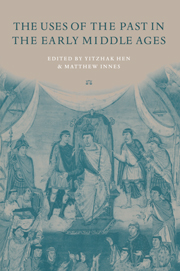Book contents
- Frontmatter
- Contents
- List of contributors
- Acknowledgements
- List of abbreviations
- Introduction: using the past, interpreting the present, influencing the future
- 1 Memory, identity and power in Lombard Italy
- 2 Memory and narrative in the cult of early Anglo-Saxon saints
- 3 The uses of the Old Testament in early medieval canon law: the Collectio Vetus Gallica and the Collectio Hibernensis
- 4 The transmission of tradition: Gregorian influence and innovation in eighth-century Italian monasticism
- 5 The world and its past as Christian allegory in the early Middle Ages
- 6 The Franks as the New Israel? Education for an identity from Pippin to Charlemagne
- 7 Political ideology in Carolingian historiography
- 8 The Annals of Metz and the Merovingian past
- 9 The empire as ecclesia: Hrabanus Maurus and biblical historia for rulers
- 10 Teutons or Trojans? The Carolingians and the Germanic Past
- 11 A man for all seasons: Pacificus of Verona and the creation of a local Carolingian past
- APPENDIX: The Memorial to Pacificus of Verona
- Index
10 - Teutons or Trojans? The Carolingians and the Germanic Past
Published online by Cambridge University Press: 14 August 2009
- Frontmatter
- Contents
- List of contributors
- Acknowledgements
- List of abbreviations
- Introduction: using the past, interpreting the present, influencing the future
- 1 Memory, identity and power in Lombard Italy
- 2 Memory and narrative in the cult of early Anglo-Saxon saints
- 3 The uses of the Old Testament in early medieval canon law: the Collectio Vetus Gallica and the Collectio Hibernensis
- 4 The transmission of tradition: Gregorian influence and innovation in eighth-century Italian monasticism
- 5 The world and its past as Christian allegory in the early Middle Ages
- 6 The Franks as the New Israel? Education for an identity from Pippin to Charlemagne
- 7 Political ideology in Carolingian historiography
- 8 The Annals of Metz and the Merovingian past
- 9 The empire as ecclesia: Hrabanus Maurus and biblical historia for rulers
- 10 Teutons or Trojans? The Carolingians and the Germanic Past
- 11 A man for all seasons: Pacificus of Verona and the creation of a local Carolingian past
- APPENDIX: The Memorial to Pacificus of Verona
- Index
Summary
In 893 Archbishop Fulco of Reims wrote to Arnulf, king of the east Frankish kingdom. Fulco had just engineered the coronation of the Carolingian Charles the Simple in west Francia, in opposition to Odo, the aristocrat who had seized the western crown in the crisis of 888. After 888, Arnulf, as a Carolingian (albeit an illegitimate one), had established a hegemony over the various kings within the Frankish empire, Odo included. Hence Fulco's need to justify the coronation of Charles the Simple and warn Arnulf against intervention in the west in a letter which marshalled fascinating historical arguments. Fulco justified his decision not to consult with Arnulf over Charles's elevation by claiming that ‘the custom of the Frankish people’ was to elect a successor from the royal line without seeking the advice of other, more powerful, neighbouring kings. To buttress his argument about Frankish custom, Fulco needed historical examples. He cited a passage on Frankish succession practices from Gregory the Great's Homilies on the Evangelists, and then directed Arnulf to a story found ‘in teutonic books’ (in libris teutonicis) which told of Ermanaric, a ruler who murdered all his relatives on the advice of bad councillors, only to be overrun by the Huns. These were fairly threadbare examples, although they did both show kingship passing on in a dynastic line. But their real force lay in the morals they suggested to Arnulf.
- Type
- Chapter
- Information
- The Uses of the Past in the Early Middle Ages , pp. 227 - 249Publisher: Cambridge University PressPrint publication year: 2000
- 9
- Cited by

